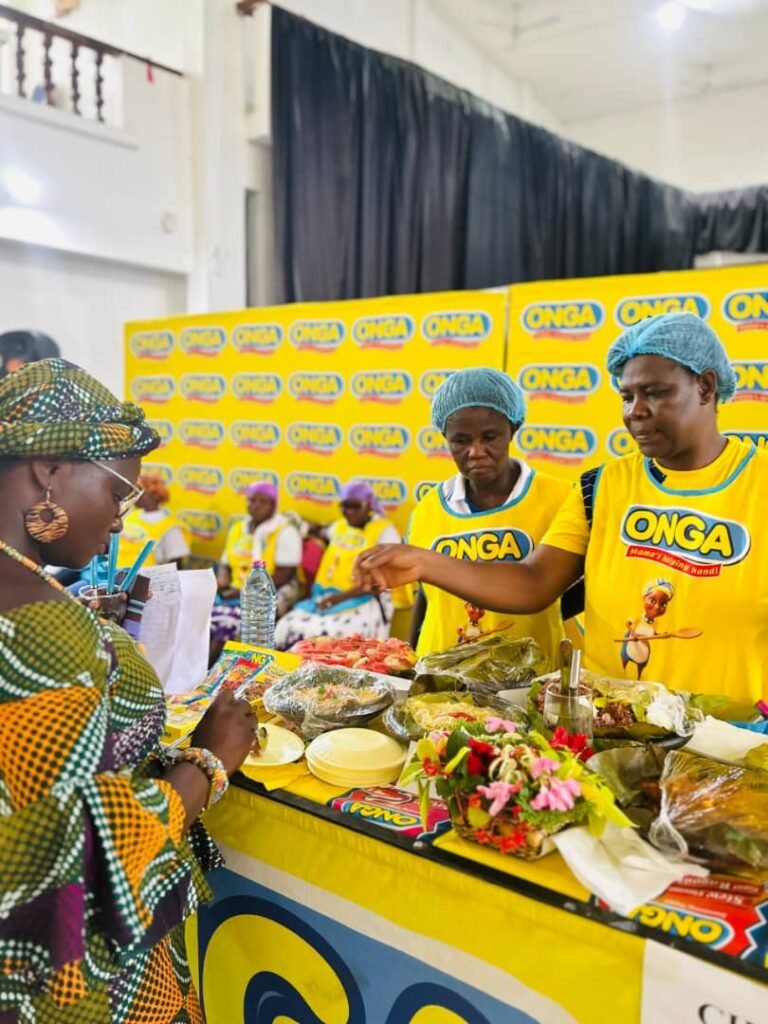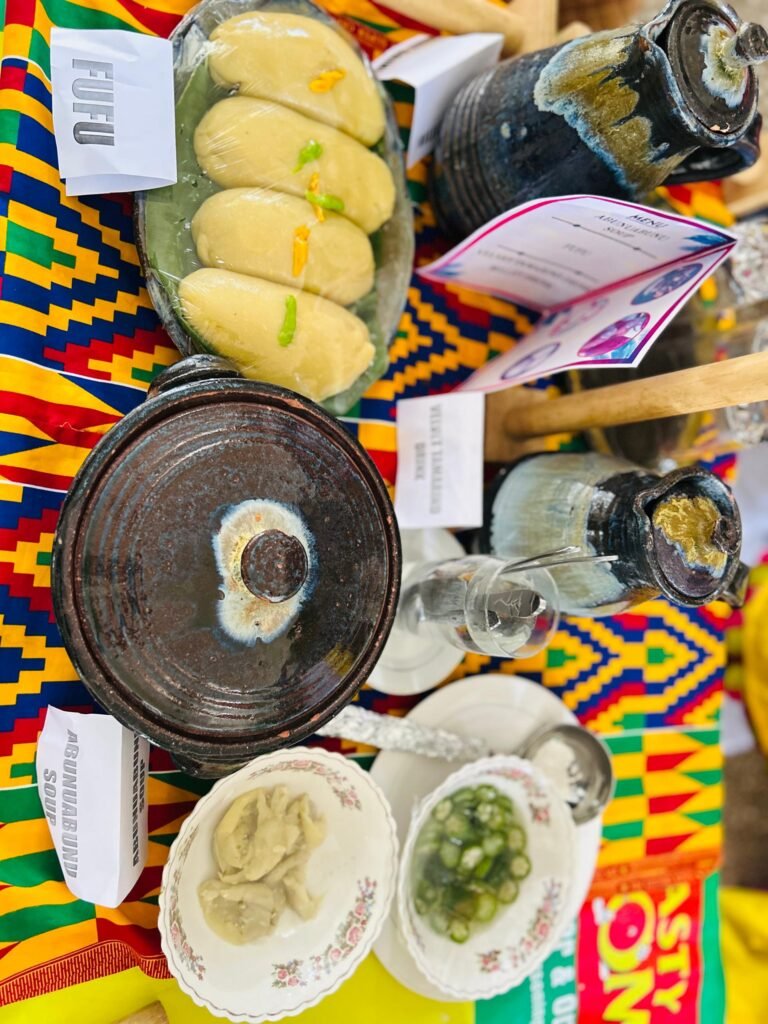News
E/R CNC organises cooking competition for religious women groups to promote Ghana’s culinary heritage

Ghana’s rich culinary heritage was on full display during this year’s Ghanaian and Traditional Food Cooking Competition for religious women groups in the Eastern Region.
The event, organised by the Eastern Regional office of the Centre for National Culture (CNC) in collaboration with Promasidor Ghana Limited, was to promote and preserve Ghana’s traditional foods while encouraging healthier eating habits.
Under the theme “Promoting and preserving our local food: A healthy life,” the competition brought together women from various religious groups, including the Assemblies of God, Christ Apostolic Church, Lion of Judah, International Central Gospel Church (ICGC), Church of Pentecost, Anglican Church, Methodist Church, Presbyterian Church Hope Assembly, and the Federation of Muslim Women Association.
Participants prepared and showcased a variety of traditional dishes, including fufu with palm nut soup, banku with okro soup, waakye with shito, and tuo zaafi, among others.
At the end of the competition, ICGC emerged winners, followed by the Presbyterian Church of Ghana in second place, and the Federation of Muslim Women Association in third.
The Eastern Regional Director of CNC, Madam Dorcas Salamatu Alhassan, expressed concern over the increasing preference for foreign and processed foods among Ghanaian families.
She emphasised that many of these foods were unhealthy compared to the traditional meals.
“Our local foods are a gift from God, rich in nutrients and essential for our well-being. It is important that we prioritise them and encourage the younger generation to do the same,” she stated.
She urged parents to introduce local dishes to their children to ensure they grow up healthy and strong, contributing meaningfully to the nation’s development.
Additionally, she encouraged Ghanaians to support made-in-Ghana products, as this would help strengthen local industries and boost economic growth.
“As we promote local food, it is also necessary to train our children to speak our local dialects,” she added, and explained that language and food are key aspects of cultural identity.
Mrs Tharzia Numako Akwetey, the New Juaben South Municipal Agriculture Director, speaking on behalf of the Eastern Regional Director of Agriculture, Habiba Yusufu, highlighted the role of local foods in maintaining physical and mental well-being.

“Our traditional foods are a core part of our identity, preserving customs and traditions while also supporting farmers, transporters, processors, hoteliers, and food vendors,” she noted.
She warned that globalisation and modernisation have led to a decline in the consumption of local foods and emphasized the need for education on their nutritional and cultural significance.
“By promoting local foods, we are preserving our heritage and ensuring a healthier future for Ghanaians,” she concluded.
From Ama Tekyiwaa Ampadu Agyeman, Koforidua
News
Prioritise affordable treatment of sickle cell treatment —Health Expert

Health experts have urged Ghana to prioritise affordable and accessible treatment for sickle cell disease (SCD) as advanced, but costly curative therapies remain out of reach.
SCD, an inherited blood disorder, affects about three in every 100 newborns in Ghana.
Globally, around 1,000 babies are born with the condition daily, with three-quarters in sub-Saharan Africa.
The disease causes severe complications including chronic pain, anaemia, infections, strokes and organ damage, often leading to shortened life expectancy.
In recent years, gene therapy has been developed as a potential cure.
However, its cost—running into millions of dollars per patient—makes it financially and technically inaccessible in Ghana.
According to Dr Lawrence Osei-Tutu, a Sickle Cell and Childhood Cancer Expert at the Komfo Anokye Teaching Hospital, “the country must instead focus on practical, lower-cost interventions such as hydroxyurea”, a decades-old cancer drug proven to reduce painful episodes, hospitalisation and life- threatening complications in SCD patients”.
Taken orally, the medicine improves red blood cell function and is considered safe and effective.
“Hydroxyurea therapy is as good as the cure and a low-hanging fruit to pluck, we must bring a cure to our sickle cell warriors, but do so sustainably.” he urged.
In a chat with The Spectator here, he said to create awareness on the disease, the expert noted that despite its benefits, “hydroxyurea is not widely accessible in Ghana.”
Stressing that, “many patients either cannot afford it or struggle with irregular supply through the health system.”
Moreover, he argued that scaling up access would provide immediate relief while the country builds the infrastructure, trains specialists and secures funding needed to support curative therapies in the future.
With an estimated 15,000 babies born with sickle cell disease annually in Ghana, Dr Osei Tutu cautioned that “failure to improve access to effective treatment will leave many patients vulnerable to preventable complications and early death.”
From Kingsley E. Hope, Kumasi
Join our WhatsApp Channel now!
https://whatsapp.com/channel/0029VbBElzjInlqHhl1aTU27
Hot!
Let’s reintroduce Cultural Studies to complement educational reforms — Tourism Minister

Madam Abla Dzifa Gomashie, the Minister of Tourism, Culture and Creative Arts, has emphasised the importance of reintroducing Cultural Studies in schools as part of Ghana’s broader educational reform agenda.
She said Cultural Studies would complement existing efforts to reposition Science, Technology, Engineering and Mathematics (STEM) and Technical Vocational Education and Training (TVET) to promote digital literacy and expand Creative Arts education.
Speaking at the 2025 Homowo Festival of the people of Ningo-Prampram, held on the theme: “Education: The Best Legacy for our Children,” Madam Gomashie said cultural education was critical to national identity and development.
She noted that the festival’s theme aligned with the Government’s vision to transform education in Ghana and encouraged the youth to embrace it not only as a means of personal development but also as a way of preserving traditional values.
These values, including patience, wisdom, and hard work, were at the core of the Homowo celebration, the Minister said.
“Cultural festivals like Homowo are vital instruments for strengthening cultural identity, preserving historical memory, and fostering national unity. Additionally, festivals serve as platforms for educating the youth through storytelling, music, dance, and other traditional practices, while also providing opportunities for community engagement.”
Madam Gomashie highlighted the strong foundation that Ghana’s tourism was built on, which included culture, traditions, and the creative industry, collectively contributing to over GH¢4.8 billion to the economy.
“Festivals give tourists reasons to visit our country. Therefore, with the right infrastructure and the development of all the domains, the sector can do more than what has been recorded,” she added.
Mr Sam Nartey George, the Member of Parliament for Ningo-Prampram and Minister of Communication, Digital Technology and Innovation, commended the community for their vibrant participation in the festival. He announced plans for the construction of a new nursing training school in Ningo, aimed at expanding access to healthcare education in the area.
Nene Osroagbo Djangmah XII, Paramount Chief of Great Ningo Traditional Area; King Dr Tackie Teiko Tsuru II, Ga Mantse; Nene Tetteh Wakah III, Paramount Chief of the Prampram Traditional Area; Prof. Odaifio Welentsi III, Paramount Chief of the Nungua Traditional Area; Naana Dugbakuwor Dugba II, Paramount Queen Mother of Great Ningo; and Mr. Elvis Afriyie Ankrah, Special Envoy on Religion and Inter-Faith Affairs, who represented the Chief of Staff, were among dignitaries at the festival. -GNA














